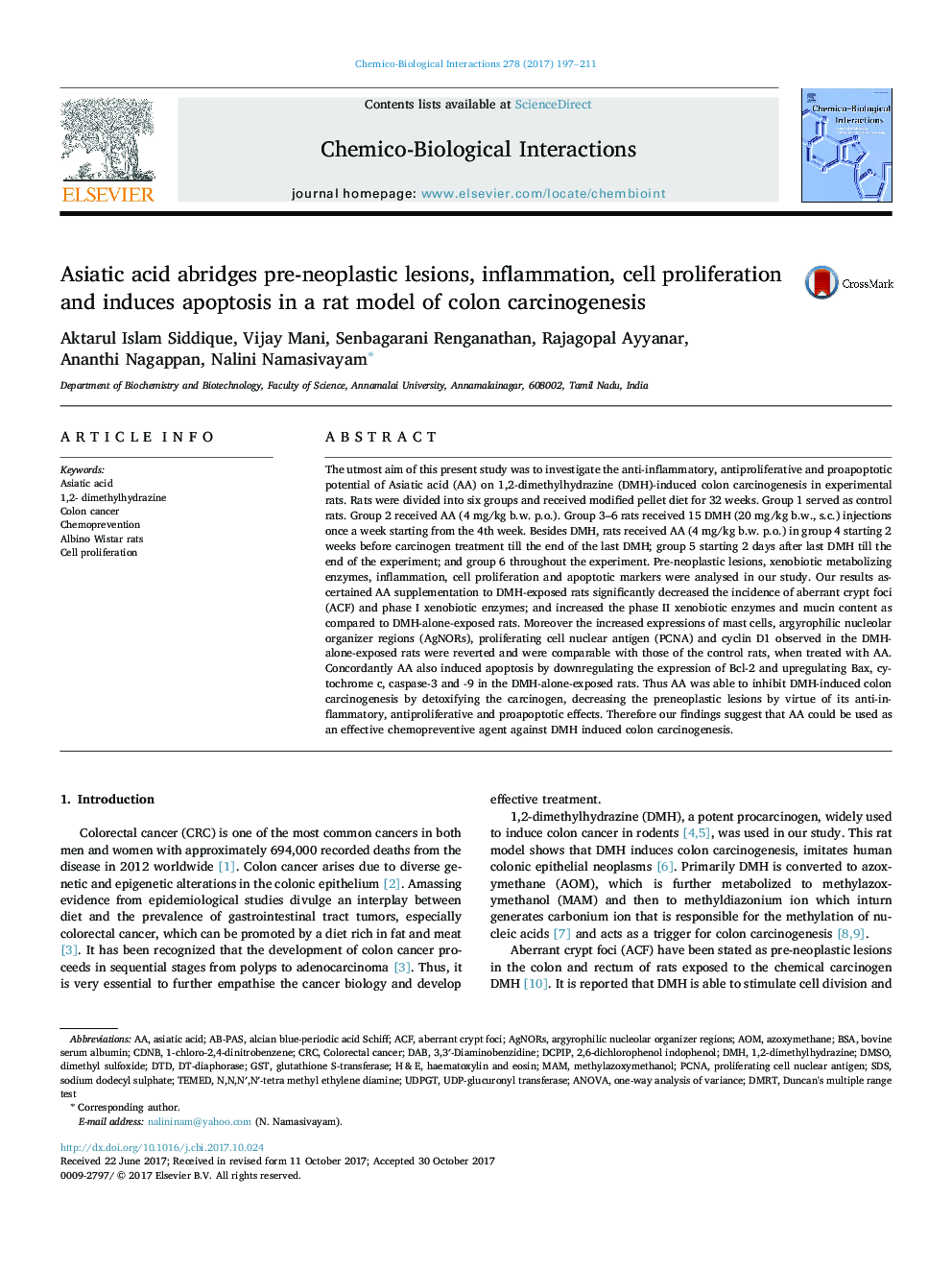| Article ID | Journal | Published Year | Pages | File Type |
|---|---|---|---|---|
| 8545427 | Chemico-Biological Interactions | 2017 | 15 Pages |
Abstract
The utmost aim of this present study was to investigate the anti-inflammatory, antiproliferative and proapoptotic potential of Asiatic acid (AA) on 1,2-dimethylhydrazine (DMH)-induced colon carcinogenesis in experimental rats. Rats were divided into six groups and received modified pellet diet for 32 weeks. Group 1 served as control rats. Group 2 received AA (4Â mg/kg b.w. p.o.). Group 3-6 rats received 15 DMH (20Â mg/kg b.w., s.c.) injections once a week starting from the 4th week. Besides DMH, rats received AA (4Â mg/kg b.w. p.o.) in group 4 starting 2 weeks before carcinogen treatment till the end of the last DMH; group 5 starting 2 days after last DMH till the end of the experiment; and group 6 throughout the experiment. Pre-neoplastic lesions, xenobiotic metabolizing enzymes, inflammation, cell proliferation and apoptotic markers were analysed in our study. Our results ascertained AA supplementation to DMH-exposed rats significantly decreased the incidence of aberrant crypt foci (ACF) and phase I xenobiotic enzymes; and increased the phase II xenobiotic enzymes and mucin content as compared to DMH-alone-exposed rats. Moreover the increased expressions of mast cells, argyrophilic nucleolar organizer regions (AgNORs), proliferating cell nuclear antigen (PCNA) and cyclin D1 observed in the DMH-alone-exposed rats were reverted and were comparable with those of the control rats, when treated with AA. Concordantly AA also induced apoptosis by downregulating the expression of Bcl-2 and upregulating Bax, cytochrome c, caspase-3 and -9 in the DMH-alone-exposed rats. Thus AA was able to inhibit DMH-induced colon carcinogenesis by detoxifying the carcinogen, decreasing the preneoplastic lesions by virtue of its anti-inflammatory, antiproliferative and proapoptotic effects. Therefore our findings suggest that AA could be used as an effective chemopreventive agent against DMH induced colon carcinogenesis.
Keywords
GSTDT-diaphoraseazoxymethaneCDNBDTDPCNAUDPGTMAMDMHAOMTEMEDUDP-glucuronyl transferaseACFDCPIPAgNORsSDSAB-PASDABDMRTAlcian blue-periodic acid Schiff1-chloro-2,4-dinitrobenzene1,2-dimethylhydrazine2,6-dichlorophenol indophenol3,3′-diaminobenzidineBSADMSOH&EDuncan's Multiple Range Testbovine serum albuminProliferating Cell Nuclear AntigenAsiatic acidANOVAone-way analysis of varianceCell proliferationDimethyl sulfoxidesodium dodecyl sulphateColorectal cancerColon canceraberrant crypt focimethylazoxymethanolArgyrophilic nucleolar organizer regionshaematoxylin and eosinChemopreventionCRCglutathione S-transferase
Related Topics
Life Sciences
Environmental Science
Health, Toxicology and Mutagenesis
Authors
Aktarul Islam Siddique, Vijay Mani, Senbagarani Renganathan, Rajagopal Ayyanar, Ananthi Nagappan, Nalini Namasivayam,
